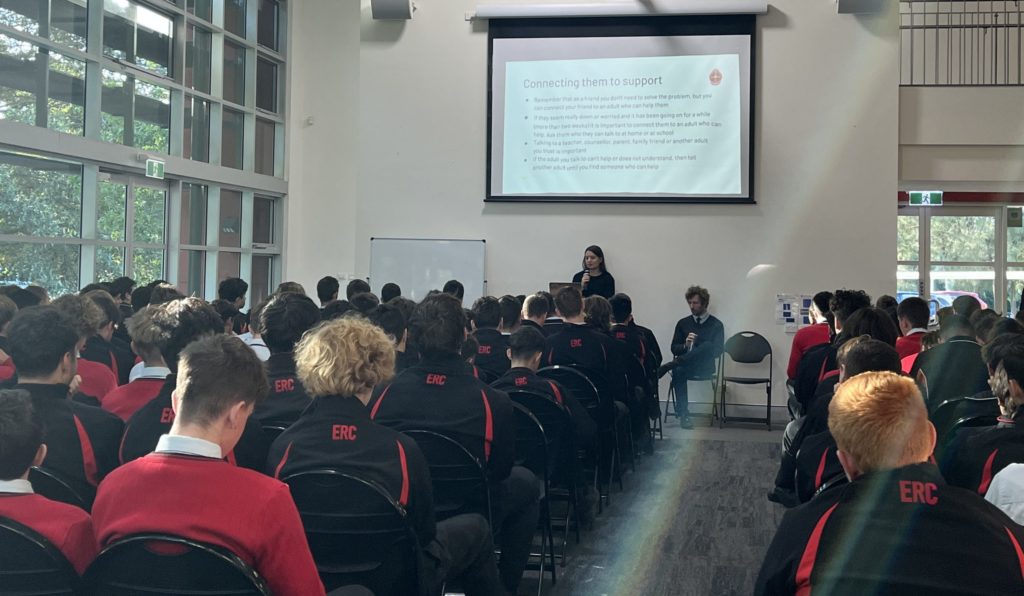In Week 3 the school counselling team presented to Year 10 students as part of the Pastoral program. The topic was ‘How to help a friend.’ The students were focused and respectful throughout.
At ERC our community of staff and students have worked hard to create a positive, help-seeking culture, particularly regarding mental health and wellbeing. We encourage students to look out for their friends and other students, and seek support from staff if they are concerned about a peer.
During the presentation the following topics were discussed:
- Signs that someone may not be coping
- How to start a conversation with someone you are concerned about
- How to react and offer support if they open up to you
- How to connect them with support at school
- How to take care of yourself
- How to access online, telephone and community support services
A summary of some of this information is provided below. It may be useful for students and their families when considering how to help a friend, family member or colleague you have concerns about.
Signs that a friend may need support:
- They are not themselves
- They prefer to be alone
- They may be unusually sad, distant or irritable
- They may not want to talk or hang out anymore
- They may skip school or not complete their work anymore
- They may eat a lot more or less than usual
- They may seem really tired all the time
- They may not want to do things they usually enjoy
How to start a conversation with someone you are concerned about:
- Find a situation that gives you time and privacy to ask
- Mention that you have noticed that they don’t seem like themselves lately and ask if they are ok
- Mention that you missed them at school/training
- Remember that their first answer might not be how they are really feeling
- Show them that you really want to listen by using open body language and waiting for their reply
- Be comfortable with silence
What to do if they open up to you:
- Listen. Let them speak without interruption or judgement
- You don’t need to have all the answers or ‘fix’ them
- Being a supportive friend can mean just sitting with them while they talk
- If they don’t want to talk, sit with them quietly to show them that you are there for them
- You can empathise by saying, “that sounds really hard”
- You can ask them what you can do to help
- Sometimes they may just want to vent or be distracted, and sometimes they may need more support from an adult
How to react and offer support if they open up to you:
- Encourage action
- Once you have listened to your friend talk about what is going on or how they are feeling, you can offer them support by asking them questions about what they might like to do next, including connecting them to an adult who can help them. Some questions could include:
“What have you done in the past to manage similar situations?”
“How would you like me to support you?”
“What’s something you can do for yourself right now? Something that’s fun or relaxing?” - You could say: “When I was going through a difficult time, I tried this… You might find it useful too.”
How to connect them with support:
- Remember that as a friend you don’t need to solve the problem, but you can connect your friend to an adult who can help them
- If they seem really down or worried and it has been going on for a while (more than two weeks) it is important to connect them to an adult who can help. Ask them who they can talk to at home or at school
- Talking to a teacher, counsellor, parent, family friend or another adult you trust is important
- If the adult you talk to can’t help or does not understand, then tell another adult until you find someone who can help
- If they are unsure you can suggest people such as pastoral coordinators, the director of pastoral care, school counsellors and any trusted adult at school. They might want to talk to their parents or another adult family member they trust (older sibling, aunt/uncle, etc) or a family friend, a coach, etc.
- If they’ve been feeling really down for more than 2 weeks, encourage them to see a health professional, such as a doctor, a counsellor or a psychologist. You could say, “It might be useful to link in with someone who can support you. I can help you find the right person to talk to. What about the school counsellor?”
All students at ERC have access to school counselling at school, where we have 2 full-time counsellors available. Referrals can be made through pastoral teachers, pastoral care coordinators, leadership, parents and carers (through contacting the school directly), and by students themselves (using the ‘I want to see a counsellor’ link at the bottom of the ERC bookmarks list). The school counsellors are happy to talk to parents about any concerns they might have about students.

Ms Potter
College Psychologist/Counsellor
